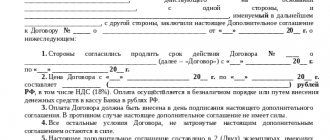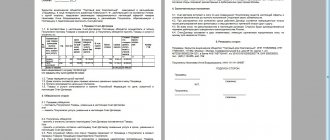To change the composition of the parties to the main obligation, an agreement on the transfer of debt is concluded. That is, the duties themselves do not cease to operate. The debtor changes. But subject to the conditions for the form, content and procedure for concluding an agreement on the transfer of debt.
The following example and recommendations will help you draw up a document correctly, taking into account the nuances of the main contract. Additional questions can be asked to the site’s duty lawyer. Other ways to settle existing debt can be found in the “Agreements” section (about debt restructuring, payment terms, etc.).
:
Debt transfer agreement
Example of a debt transfer agreement
Debt transfer agreement
Novorossiysk September 12, 2021
Petrosukhov Pavel Borisovich, born on May 11, 1972, passport of a citizen of the Russian Federation series 25 43 number 798564, issued by TOM Zheleznodorozhny district of Vorkuta, registration address: Novorossiysk, st. Vyatkina, 87, hereinafter referred to as the “Original Debtor”, and
Limited Liability Company "Triad", OGRN 4687464254, represented by director Dobrynin Igor Sergeevich, acting on the basis of the Charter, hereinafter referred to as the "New Debtor", collectively referred to as the "Parties", have entered into this agreement as follows:
- By agreement of the Parties, the obligation of the Original debtor to pay the debt in the amount of 150,000 rubles passes to the New debtor. and interest for the use of funds in the amount of 17,000 rubles. (total amount of debt 167,000 rubles) in accordance with the loan agreement between Rodion LLC and Pavel Borisovich Petrosukhov No. 4-Z dated January 11, 2021.
- At the time of signing this agreement, the debt of the Initial Debtor to the Creditor is 167,000 rubles, which is confirmed by reconciliation act No. 6 dated September 10, 2018.
- When concluding this agreement, the original debtor transfers to the New debtor, under the transfer and acceptance certificate, documents related to the fulfillment of the obligation under the agreement, namely loan agreement No. 4-Z dated January 11, 2018.
- The Initial Debtor undertakes, at the request of the New Debtor, to provide him with all necessary information related to the fulfillment of the obligation under the contract.
- The Creditor's preliminary consent to transfer the debt was received in writing on September 10, 2018 and is an integral part of this agreement.
- The original debtor undertakes, within 5 business days from the date of conclusion of this agreement, to notify the Creditor in writing of the completed transfer of debt by sending a notice.
- All disputes and disagreements between the Parties are resolved through negotiations. If it is impossible to resolve disputes and disagreements through negotiations, the dispute shall be resolved in court in accordance with the current legislation of the Russian Federation.
- This agreement comes into force from the moment it is signed by the Parties and is valid until they fully fulfill their obligations.
- The Agreement is drawn up in 3 copies - one for each Party and one for the Lender.
- Details and signatures:
Original debtor
Petrosukhov Pavel Borisovich, born on May 11, 1972, passport of a citizen of the Russian Federation series 25 43 number 798564, issued by TOM Zheleznodorozhny district of Vorkuta, registration address: Novorossiysk, st. Vyatkina, 87
P.B. Petrosukhov
New debtor
Triada LLC, OGRN 4687464254, TIN 498796546 address: Russia, Penza region, Penza, st. Leningradskaya, 19
Director I.S. Dobrynin
DEBT TRANSFER AGREEMENT
| Place of detention | Conclusion date |
_________________________, hereinafter referred to as the “Original Debtor”, represented by ___________________________________________________, acting on the basis of _____________________________, on the one hand, and ______________________, hereinafter referred to as the “New Debtor”, represented by ___________________________________________ , acting on the basis of ________________________, on the other hand,
collectively referred to as the “Parties”, and individually referred to as the “Party”,
have entered into this debt transfer agreement (hereinafter referred to as the “Agreement”) as follows:
Subject of the agreement
1.1. The “New Debtor” assumes full obligations to pay the principal debt, interest and amounts of penalties of the “Original Debtor” under the Name of the agreement dated “___”_____________. (hereinafter referred to as the “Main Agreement”) concluded between the “Original Debtor” and the Name of the Creditor (hereinafter referred to as the “Creditor”).
1.2. As consideration for the assumption of the debt specified in clause 1.1 of the “Agreement”, the “Original Debtor” undertakes to release the “New Debtor” from the obligation to pay an amount of __________________________ (Amount of the agreement (contract) in words) RUB. according to the Name of the agreement dated “___”_____________, concluded between the “Original Debtor” and the “New Debtor”.
1.3. The amount of the principal debt under the “Main Agreement” is __________________________ (Amount of the agreement (contract) in words) rub.
The amount of interest and penalties under the “Main Agreement” is _________________________ (Amount of debt for interest and penalties in words) rub.
1.4. The consent of the “Creditor” to transfer the debt under the “Main Agreement” was received “___”_____________. (Appendix No.______ to the “Agreement”).
Contract time
2.1. The “Agreement” comes into force on “___”____________. and is valid until the obligations under the “Agreement” are fully fulfilled.
Rights and obligations of the parties
3.1. The "Original Debtor" undertakes:
3.1.1. Transfer to the “New Debtor” within ________ business days from the date of signing the “Agreement” the following documents related to the “Main Agreement”: ____________________________________________________________.
3.1.2. Transfer all correspondence with the “Creditor” under the “Main Agreement”, which is available to the “Original Debtor”.
3.1.3. Within ___________ business days from the date of receipt from the “New Debtor” of a written notice of payment to the “Creditor” of the entire amount under the “Agreement”, make counter-payment for the acceptance of the debt by the “New Debtor” in accordance with clause 1.2 of the “Agreement”.
3.1.4. Inform the “New Debtor” of all other information relevant for the “New Debtor” to exercise its rights and obligations under the “Main Agreement”.
3.2. The “new debtor” undertakes:
3.2.1. Pay the principal amount, as well as interest and penalties under the “Main Agreement” in the amount specified in clause 1.3 of the “Agreement”.
3.2.2. Inform the “Original Debtor” in writing about the payment made under the “Agreement”.
3.2.3. Accept the documents specified in clause 3.1.1 of the Agreement. When transferring the documents specified in this paragraph, an act of acceptance and transfer of documents is signed between the “Original Debtor” and the “New Debtor” (Appendix No. ___ to the “Agreement”).
3.3. The “new debtor” has the right:
3.3.1. Raise objections to the “Creditor’s” claim based on the relationship between the “Creditor” and the “Original Debtor.”
Payment procedure
4.1. The “New Debtor” is obliged to pay the amount of the accepted debt to the “Creditor” in the amount and amount in accordance with paragraphs. 1.1, 1.3 of the “Agreement” in accordance with the “Schedule for payment of the debt amount” (Appendix No. ___ to the “Agreement”).
4.2. Method of paying the debt under the “Main Agreement”: transfer by the “New Debtor” of funds in the currency of the Russian Federation (ruble) to the settlement account of the “Creditor”. In this case, the obligations of the “New Debtor” regarding payment under the “Agreement” are considered fulfilled from the day the funds are written off by the bank of the “New Debtor” from the account of the “New Debtor”.
Responsibility of the parties
5.1. The “Parties” are responsible for failure to fulfill or improper fulfillment of their obligations under the “Agreement” in accordance with the “Agreement” and the legislation of Russia.
5.2. The penalty under the “Agreement” is paid only on the basis of a justified written request of the “Parties”.
5.3. Each of the “Parties” is responsible for damage caused to the other “Party” if it arose through its fault as a result of non-fulfillment or improper execution of the “Agreement”.
5.4. Responsibility of the “Original Debtor”:
5.4.1. The “Original Debtor” is responsible to the “New Debtor” for the invalidity of the debt transferred to him under the “Agreement”. In this case, the “Original Debtor” undertakes to compensate for the damage caused to the “New Debtor” by the invalidity of the debt under the “Agreement”.
5.4.2. If the “Original Debtor” violates the obligations to transfer documents specified in clause 3.1.1 of the “Agreement,” the “Original Debtor” shall pay the “New Debtor” a penalty in the amount of _______ percent of the amount of debt under the “Main Agreement” for each day of delay, but not more than _________ percent.
5.5. The “Original Debtor” is not liable to the “New Debtor” for the failure or improper fulfillment by the “Creditor” of obligations under the “Main Agreement”.
5.6. The “Original Debtor” is not liable to the “Creditor” for the failure or improper fulfillment by the “New Debtor” of obligations under the “Main Agreement”.
Grounds and procedure for termination of the contract
6.1. The “Agreement” may be terminated by agreement of the “Parties”, as well as unilaterally upon the written request of one of the “Parties” on the grounds provided for by the “Agreement” and the law.
6.2. Unilateral termination of the “Agreement” is carried out only upon the written request of the “Parties” within ______ calendar days from the date the “Party” receives such a request.
6.3. The “Original Debtor” has the right to terminate the “Agreement” unilaterally in the event of failure by the New Debtor to comply with clause 3.2.1 of the “Agreement”.
6.4. The “New Debtor” has the right to terminate the “Agreement” unilaterally in the event of failure by the Initial Debtor to comply with paragraphs. 3.1.1, 3.1.3 “Agreements”.
6.5. The “Agreement” can be terminated only after the written consent of the “Lender”.
Resolution of disputes from the contract
7.1. The claim procedure for pre-trial settlement of disputes from the “Agreement” is mandatory for the “Parties”.
7.2. Claim letters are sent by the “Parties” by courier or registered mail with notification of delivery of the latter to the addressee at the location of the “Parties” specified in clause 11 of the “Agreement”.
7.3. Sending claim letters by the “Parties” in a manner other than specified in clause 7.2 of the “Agreement” is not permitted.
7.4. The period for consideration of a claim letter is ____ business days from the date of receipt of the latter by the addressee.
7.5. Disputes arising from the “Agreement” are resolved in court in the _________________________ court.
Force Majeure
8.1. The “Parties” are released from liability for complete or partial failure to fulfill obligations under the “Agreement” in the event that the failure to fulfill obligations was the result of force majeure, namely: fire, flood, earthquake, strike, war, actions of government authorities or other actions independent of “ Parties" circumstances.
8.2. The “Party” that cannot fulfill its obligations under the “Agreement” must promptly, but no later than ________ calendar days after the occurrence of force majeure circumstances, notify the other “Party” in writing, providing supporting documents issued by the competent authorities.
8.3. The “Parties” acknowledge that the insolvency of the “Parties” is not a force majeure circumstance.
Other conditions
9.1. The “parties” have no underlying oral agreements. The content of the text of the “Agreement” fully corresponds to the actual expression of the will of the “Parties”.
9.2. All correspondence on the subject of the “Agreement” preceding its conclusion loses legal force from the date of conclusion of the “Agreement”.
9.3. The “Parties” acknowledge that if any of the provisions of the “Agreement” becomes invalid during the term of its validity due to changes in legislation, the remaining provisions of the “Agreement” are binding on the “Parties” during the term of the “Agreement”.
9.4. The “Agreement” is drawn up in three copies: 1 (one) for the “Original Debtor”, 1 (one) for the “New Debtor” and 1 (one) for the “Creditor”, each of them having equal legal force.
List of applications
10.1. Appendix No. _____- “Consent to transfer of debt.”
10.2. Appendix No. _____ - “Certificate of acceptance and transfer of documents.”
10.3. Appendix No. _____ - “Schedule of payment of the debt amount.”
Addresses and details of the parties
| "Original Debtor" | "New Debtor" |
Signatures of the parties
12.1. On behalf of the “Original Debtor” __________ Last name and initials
12.2. On behalf of the “New Debtor” __________ Last name and initials
Download the document “Debt Transfer Agreement”
Who enters into a debt transfer agreement?
An analysis of the underlying obligation will help identify the parties who enter into an agreement to transfer the debt. As a general rule, the document is signed between the original debtor and the new debtor. In this case, the creditor is not a party, but only expresses written consent to the transfer of debt.
However, if the main obligation is related to the implementation of entrepreneurial activities by its parties, then the Civil Code of the Russian Federation allows the conclusion of such an agreement by the creditor and the new debtor. And in this case, consider:
– the original debtor may continue to be liable to the creditor. Moreover, by default it will be solidary (joint). And only if directly indicated in the contract can it be subsidiary (in part).
– the original debtor is released from liability to the creditor only if such a circumstance is directly indicated in the text of the agreement.
– the new debtor who fulfills the obligation becomes a creditor in relation to the original debtor, unless otherwise specified in the text of the agreement.
Debt transfer
Home › Bankruptcy › Information about bankruptcy
13.04.2019
Debt transfer refers to the transfer of debt obligations by the debtor to a third party/persons. The process is the opposite of assignment, where the creditor changes. Debt obligations are transferred by court or other legal decision (for example, in the event of reorganization of the borrower), or on the basis of an agreement/transaction between the debtor and the creditor.
The debtor is required to obtain official permission from the creditor regarding the transfer of debt obligations (Article 391 of the Civil Code), except in cases where the debt is transferred by court decision.
The most common option is to conclude a written agreement, where three parties sign: the creditor, the old and the new debtor.
The concept of a tripartite debt transfer agreement
A tripartite agreement signed by all three parties automatically transfers debt obligations from the old debtor to the new one.
You cannot transfer the debt to a new person (legal or physical) if one of the parties does not agree.
The new debtor, after signing the agreement, bears full responsibility for returning the funds to the creditor, and the original borrower is completely relieved of this responsibility.
The agreement is tripartitely signed by three parties:
- Lender (individual, bank, credit institution, etc.).
- A person (individual or legal entity) who assumes obligations to repay borrowed funds.
- The original debtor who has a receivable or payable.
The creditor has the right to refuse to transfer the debt if he is not confident that the new debtor will be able to ensure repayment of the debt within the established time frame.
Legal basis
The legal basis regarding the transfer of debt is contained in the second paragraph of the Civil Code of the Russian Federation. Two articles and three subparagraphs are devoted to this issue:
- “Condition and form of debt transfer.”
- “Objections of the new debtor regarding creditor claims” (the new debtor has the right to object to the creditor’s claims, reducing the amount of debt obligations due to certain circumstances).
- “Rights of the creditor regarding the new debtor” (relative to the new debtor, all the same rights can be transferred to the creditor, or new ones can be prescribed).
- “Transfer of debt by force of law” (debt is transferred forcibly by a court or other legal decision).
- "Transfer of contract."
Creditor in a debt transfer agreement
In the form of a separate document (in writing, of course) or by signing a debt transfer agreement (at the bottom of the page indicating consent).
The lender can also issue a preliminary consent. In this case, the debtor sends a notice of transfer of debt (it is better to indicate whether the new debtor or the previous one is drawing up such a document in the text of the document).
If the creditor's consent is not properly executed, the agreement will be considered void. Moreover, there is no need to go to court with a claim to declare the transaction invalid. You can immediately file a claim for debt collection (subject to pre-trial procedures). The consent of the creditor is not required if the transfer of debt is carried out by force of law (inheritance, reorganization, etc.)
Form and content of the debt transfer agreement
Written form for such agreements is mandatory. If the main agreement on the basis of which the debt arose was subject to notarization or state registration, the transfer of the debt is formalized in a similar way.
The debt can be transferred in full, or partially, including only penalties and other sanctions. The debt itself is not necessarily cash. It is possible to transfer obligations to perform certain work, deliver goods, etc. (only not very personal debts).
A popular question is about the price of debt transfer. After all, as a general rule, any contract in civil law is assumed to be compensated. Even if there is no price in the agreement, it is determined by the cost of the debt.
If the main obligation was secured by a pledge, surety and other means, and the original debtor, in accordance with the terms of the debt transfer agreement, is released from liability to the creditor, such security is terminated (according to the general rule, to which, of course, there may be exceptions).





